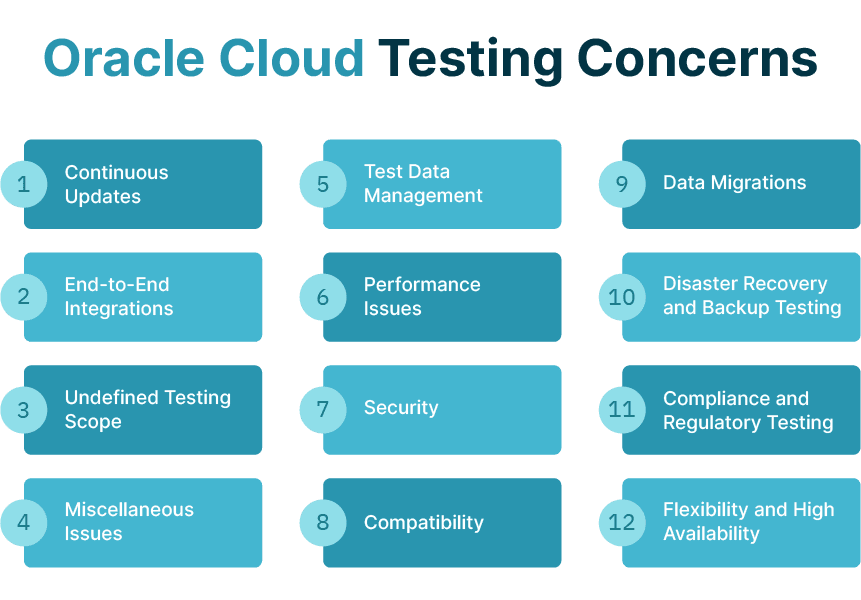Oracle Cloud is the bedrock of your business; if it fails, you could experience costly disruptions. Thus, the performance and reliability of your Oracle application is critical to the success of your organization. Testing guarantees that your data is secure and properly configured, so your end users can conduct their everyday operations effortlessly and upgrades can be carried out smoothly.
There are various issues that organizations frequently face when it comes to Oracle testing. Here are some of the most common Oracle testing concerns:
- Continuous Updates: Oracle cloud apps are constantly changing, with updates delivered to clients every quarter. These upgrades provide new functionality, features, and bug fixes that help businesses manage their operations more effectively. While these updates improve capabilities, they have the potential to disrupt existing business processes. When Oracle users only have two weeks to test these updates, testing becomes even more crucial.
Read more: 6 Tips to Sail Through Your Next Oracle Cloud Update
- End-to-End Integrations: Oracle applications are widely dispersed and interconnected with several end-to-end business processes, such as mobile user interfaces, web services, ESBs, APIs, web UIs, mainframes, and other ERPs. Although Cloud apps are updated on a frequent basis, end-to-end testing is essential to ensure that these business processes continue to work after any configuration change or update.
- Undefined Testing Scope: Oracle updates introduce new features that have the potential to disrupt existing business processes. Because Oracle users only have two weeks to test these changes, determining which business processes to test is critical. Non-essential procedures are tested, wasting resources. And if essential processes are not tested, they may fail. According to Forrester, most businesses only test 40% of the business processes that should be tested.
- Miscellaneous Issues: Changes in customizations and integrations can introduce defects in your current Oracle versions, which should be considered when beginning a new upgrade. In reviewing these pain points and errors, it makes sense to hone in on a few things to fix from your current ERP system in your upgrade project. This includes identifying non-relevant objects, unused solutions, and defects that you want to avoid in your new Oracle version.
- Test Data Management: Getting the right data to test an Oracle application is an ongoing struggle for testers. Oracle testing tools must ensure that test data is always available and can be easily retrieved and updated within the Oracle database without any loss or corruption.
- Performance Issues: Oracle customers usually struggle to achieve scalability, throughput, quick response times, and resource utilization. The application must be tested under a variety of loads and conditions to fix performance bottlenecks.
- Security: Oracle applications often contain sensitive data, so security testing becomes of primary concern. Access controls, authentication procedures, data encryption, and auditing functionality should all be validated during testing. Vulnerability assessments and penetration testing should be undertaken to discover and fix potential security flaws.
- Compatibility: Oracle databases may interface with a wide range of applications, operating systems, and hardware configurations. Compatibility testing guarantees that the Oracle system works flawlessly with various environments and components, such as web servers, middleware, and client applications.
- Migrations: Organizations often need to migrate data from legacy systems or older versions of Oracle to newer versions. Data migration testing guarantees that data is successfully transported, transformed, and evaluated during the migration process while ensuring data integrity and consistency.
- Disaster Recovery and Backup Testing: Oracle testing requires disaster recovery and backup in case of unexpected events or system failures. Backup and recovery methods, including disaster recovery plans, should be tested to ensure that data can be restored and the system can resume operation with little downtime.
- Compliance and Regulatory Testing: Oracle applications must comply with certain regulations and standards depending on their sector and geographical area. Testing is carried out to check if your Oracle application complies with all applicable compliance requirements, such as data protection legislation (e.g., GDPR) or industry-specific rules (e.g., HIPAA for healthcare).
- Flexibility and High Availability: Oracle systems can handle higher workloads than other, older systems. Rigorous testing is required for uninterrupted operation during peak usage or in the case of hardware or network problems.
To ensure the dependability, performance, security, and compliance of Oracle systems, you must utilize high-velocity Oracle test automation tools and frameworks. Simply put, when it comes to adequate Oracle testing, automation is required since it reduces risk and speeds up testing cycles to avoid business disruptions.

How Opkey Helps in Oracle Testing
No-code test creation: To address changes in functionality after the Oracle upgrades, business users have to create additional test cases. Opkey’s no-code test automation enables non-technical people to create automated tests using a drag-and-drop interface and by recording their activities automatically.
Update impact assessment: Opkey’s impact analysis report provides a comprehensive picture of impacted business flows and test cases in the updated version. This will help in the development of test plans by identifying what will be most impacted by an update and what needs to be tested first. Opkey helps customers cut Oracle Cloud update windows down from months and weeks to three days or less.
End-to-end testing: End-to-end testing is necessary to ensure that critical integrations and business processes continue to function following an Oracle upgrade. Opkey notifies users if their middleware, or third-party apps are in jeopardy, guaranteeing that if your Oracle changes, your entire business process does not break.
Test data management: Finding the necessary data to test an Oracle app is a constant challenge for testers. Opkey addresses this issue with an automated test data management system that ensures the appropriate test data is always available for automated testing.
Maintaining compliance: If testing is not exhaustive and thorough, application data may be compromised, resulting in a compliance violation. Opkey’s quality assurance framework ensures that the Oracle application complies with all applicable compliance requirements.







